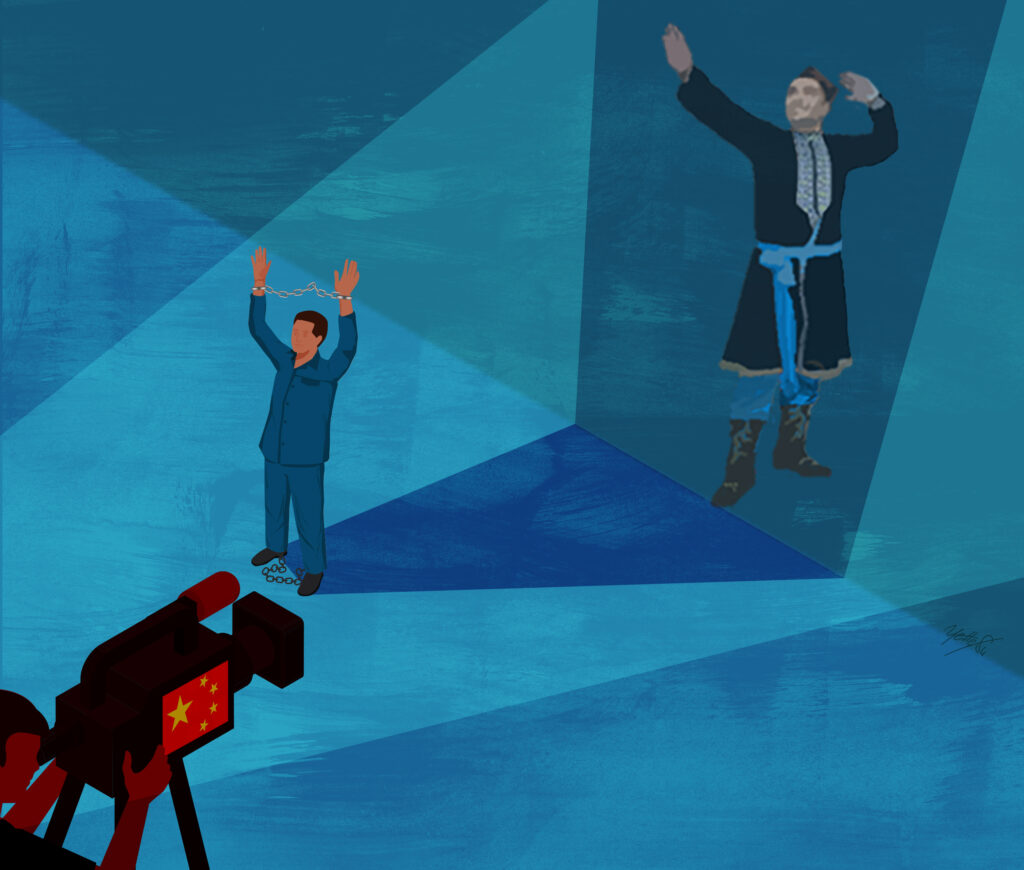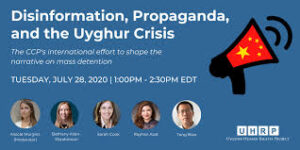
“The Happiest Muslims in
the World”? UHRP
Fetishizing the labels we give to acts of horror skews our responses to other atrocities, says a prominent expert.
 In recent days the horrendous treatment of the Uighur community by the Chinese government has received the attention it requires, notes Philippe Sands, professor of law at University College London, and author of East West Street: On the Origins of “Genocide” and “Crimes Against Humanity” and The Ratline: Love, Lies and Justice on the Trail of a Nazi Fugitive. A complaint of genocide, as well as crimes against humanity, has been lodged with the International Criminal Court but the former is always difficult to prove. So what is to be done? he asks in The FT:
In recent days the horrendous treatment of the Uighur community by the Chinese government has received the attention it requires, notes Philippe Sands, professor of law at University College London, and author of East West Street: On the Origins of “Genocide” and “Crimes Against Humanity” and The Ratline: Love, Lies and Justice on the Trail of a Nazi Fugitive. A complaint of genocide, as well as crimes against humanity, has been lodged with the International Criminal Court but the former is always difficult to prove. So what is to be done? he asks in The FT:
{Polish jurist Raphael Lemkin’s} original conception set a lower bar on the meaning of genocide than the 1948 convention adopts, so more acts could be legally included. One option would be to revert to that approach — genocide is not a numbers game, and the kind of forced sterilisations now being alleged in Xinjiang should be recognised as genocidal acts. Another might be for states to expeditiously adopt the draft convention on crimes against humanity that has been prepared by the UN’s International Law Commission.
 Whichever path is chosen, we must not fetishise the names we give to acts of horror. The treatment of the Uighurs, or the Yazidis, or the Rohingya, or myriad other groups and individuals, is wrong and criminal, whatever it is called. For the sake of Uighurs, who need our active and urgent support, let us focus on the substance, not the label.
Whichever path is chosen, we must not fetishise the names we give to acts of horror. The treatment of the Uighurs, or the Yazidis, or the Rohingya, or myriad other groups and individuals, is wrong and criminal, whatever it is called. For the sake of Uighurs, who need our active and urgent support, let us focus on the substance, not the label.
In “The Happiest Muslims in the World”: Disinformation, Propaganda and the Uyghur Crisis, the Uyghur Human Rights Project traces the evolution of the Chinese government’s attempts to promote a narrative – from secrecy and denial to whitewashing and justification – responding to international criticism of its large-scale arbitrary detention of Uyghurs and other Turkic peoples.
The Uyghur human rights crisis has been a major test of the Chinese government’s ability to shape discourse and control information on a subject that seriously jeopardizes its reputation, a launch meeting for the report heard today. In response to the emergence of evidence of its secret campaign of mass detention, the ruling Chinese Communist Party (CCP) has shifted the narrative on the camps, first from silence, to denial, to attempts to frame them as a tool in a legitimate counter-terrorist struggle, a panel of experts (above) suggested.
“The CCP is relentless in its efforts to cover up and justify its human-rights crimes against Uyghurs,” said Omer Kanat, Executive Director of UHRP, a partner of the National Endowment for Democracy (NED). “The authorities claim that the world should applaud their policies in East Turkistan, but they cannot admit what they are really doing. This large-scale disinformation and propaganda campaign is the other side of the coin of genocidal repression.”
 The U.S. Congress recently approved new legislation—the Uyghur Human Rights Policy Act of 2020—condemning the Chinese Communist Party (CCP) for continued human rights violations against the Uyghurs and other Turkic Muslims in East Turkistan, also known as the Xinjiang Uyghur Autonomous Region of northwest China, the NED adds.
The U.S. Congress recently approved new legislation—the Uyghur Human Rights Policy Act of 2020—condemning the Chinese Communist Party (CCP) for continued human rights violations against the Uyghurs and other Turkic Muslims in East Turkistan, also known as the Xinjiang Uyghur Autonomous Region of northwest China, the NED adds.
Despite the constant efforts of the CCP to undermine the advocacy of Uyghur groups around the world, the legislation earned tremendous bipartisan support with 68 cosponsors, led by U.S. Senators Marco Rubio (R-FL) and Bob Menendez (D-NJ). A stinging rebuke of one of the world’s most brazen and egregious violations of human and minority rights. To further democracy and human dignity for all people in China, the NED has awarded $8,758,300 to Uyghur groups since 2004, serving as the only institutional funder for Uyghur advocacy and human rights organizations.







